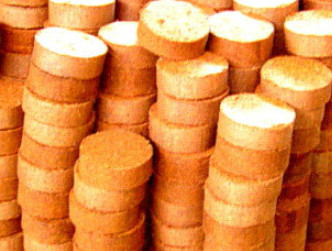Coco peat and coir, derived from coconut husks, offer a wide range of sustainable products. Let’s delve into the various forms and their applications:
1. Coir Dust
Coir dust, also known as coco peat or coir pith, is a byproduct of the coir fiber extraction process. It is a spongy material that retains moisture well and is commonly used as a soil amendment in horticulture and agriculture. Coir dust improves soil aeration, retains nutrients, and enhances water retention, making it an excellent component for potting mixes, hydroponics, and as a soil conditioner.
2. Fibrous Strands
Fibrous strands of coir are the long, coarse fibers extracted from the outer husk of coconuts. These strands are strong and durable, often used in the production of brushes, brooms, mats, and rugs. The fibers can also be spun into yarn for weaving various textiles and household items.
3. Coir Chips
Coir chips are small, chunky pieces of coir used primarily in horticulture. They provide excellent aeration and drainage when mixed with soil, making them ideal for use in potting mixes, especially for orchids and other epiphytic plants. Coir chips are also used as mulch, providing a protective layer that helps retain soil moisture and suppress weeds.
4. Coir Discs

Coir discs are pre-formed discs made from compressed coir pith, often used in horticulture for seed starting and plant propagation. These discs expand when hydrated and provide a convenient, sterile, and nutrient-rich medium for seedlings. Coir discs are biodegradable and can be directly planted into the soil, reducing transplant shock.
5. Coir Blocks
Coir blocks are compressed blocks of coir pith or coir fiber. When soaked in water, these blocks expand to several times their original volume, producing a lightweight, organic growing medium. Coir blocks are used in gardening and horticulture as a sustainable alternative to peat moss. They improve soil structure, retain moisture, and promote healthy root growth.
6. Hand-Knotted Netting
Hand-knotted coir netting is made from coir fibers woven into nets by hand. This biodegradable netting is commonly used for soil erosion control, especially on slopes and embankments. It stabilizes the soil, promotes vegetation growth, and prevents landslides. Hand-knotted coir netting is also used in landscaping and horticulture for supporting climbing plants.
7. Coir Rope
Coir rope is made by twisting coir fibers into a strong and durable cord. It is widely used in agriculture, horticulture, shipping, and construction. Coir rope is resistant to saltwater and can be used for mooring boats, tying cargo, and creating garden trellises and supports. It is also used in the production of furniture, mats, and handicrafts.
8. Curled Coir
Curled coir is coir fiber that has been twisted and curled to create spring-like structures. It is commonly used in the production of mattresses, cushions, and upholstery due to its resilience and cushioning properties. Curled coir provides firm support and excellent ventilation, making it a popular choice for eco-friendly and sustainable bedding products.
Coco peat and coir base products
Coco peat and coir base products, derived from coconut husks, offer a wide range of sustainable solutions. Let’s explore these eco-friendly products in detail:
Coco Peat Products
- Coco Husk Chip Bales
- Long-lasting mulch for gardens and landscaping
- Excellent for moisture retention and weed suppression
- Ideal for orchid cultivation and other epiphytic plants
- Coconut Peat Bag
- Ready-to-use growing medium for container gardening
- Promotes healthy root development
- Environmentally friendly alternative to traditional potting soil
- Compressed 5kg Coconut Peat
- Space-efficient packaging for easy storage and transport
- Expands significantly when hydrated
- Versatile substrate for various gardening applications
- Coconut Peat Briquettes
- Compact form of coco peat for easy handling
- Used in hydroponics and as a soil amendment
- Excellent water retention properties
- Coconut Peat Discs
- Convenient for seed starting and propagation
- Expand when wet to create individual planting cells
- Biodegradable and transplant-friendly
- Coconut Peat Grow Bags
- Pre-filled bags for container gardening and commercial horticulture
- Promotes excellent drainage and aeration
- Ideal for growing vegetables, fruits, and flowers
- Planter Bags
- Biodegradable alternative to plastic pots
- Allows for direct planting, reducing transplant shock
- Suitable for nurseries and home gardening
Coir Base Products
- Bristle Fibre
- Used in brush and broom manufacturing
- Durable and naturally resistant to wear
- Eco-friendly alternative to synthetic bristles
- Coir Bale Fibre
- Raw material for various coir products
- Used in upholstery, mattress manufacturing, and rope making
- Sustainable alternative to synthetic fibers
- Coir Geotextiles
- Used for soil erosion control and slope stabilization
- Biodegradable solution for civil engineering projects
- Promotes vegetation growth while preventing soil loss
- Coir Weed Mat
- Natural weed suppression for gardens and landscaping
- Allows water and air penetration while blocking sunlight
- Biodegrades over time, enriching the soil
- Erosion Control Blanket
- Protects seedlings and promotes vegetation establishment
- Used in revegetation of slopes and riverbanks
- Biodegradable alternative to synthetic erosion control products
Coco peat and coir base products offer a diverse range of sustainable solutions for agriculture, horticulture, and environmental management. Their versatility, biodegradability, and renewable nature make them increasingly popular in our eco-conscious world.
